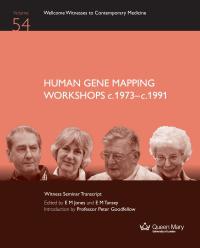Human Gene Mapping Workshops c.1973-c.1991
 'They were very much workshops from the ground up, from the people who wanted to work together with no formal organization, no major committees, no society. We just got on and compared notes and eventually did collaborative experiments …' Professor Sir Walter Bodmer
'They were very much workshops from the ground up, from the people who wanted to work together with no formal organization, no major committees, no society. We just got on and compared notes and eventually did collaborative experiments …' Professor Sir Walter BodmerThis Witness Seminar discusses the scientific origins of gene mapping and emergence of the Human Gene Mapping Workshops (HGMW). From HGM1 in Yale (1973) to HGM11 in London (1991), key scientists, based principally in the UK, share memories of participating in these workshops and reflect on the historical importance of the HGMW in contemporary biomedicine.
Topics include the influence of somatic cell genetics; role of non-human gene mapping; advent of DNA-based techniques; the culture of collaboration in the gene mapping community; nomenclature challenges; clinical applications; the informatics revolution; the origins of the Human Genome Project and advent of sequencing technologies. Throughout, tribute is paid to the contributions of international colleagues to gene mapping.
The seminar was chaired by Professor Peter Harper, and the volume is introduced by Professor Peter Goodfellow.
'… criticism is so characteristic of nomenclature, it’s always so controversial and people get so het up about it. Their gene is like their baby and everyone always agrees that one gene should only have one name but they are sure it should be theirs.' Professor Sue Povey
Jones E M, Tansey E M. (eds) (2015)
Wellcome Witnesses to Contemporary Medicine, vol. 54. London: Queen Mary University of London.
ISBN 978 1 91019 503 1
'… as soon as two kilobases of human DNA sequence was accumulated it would be released immediately on the internet, the ‘no intellectual property’ position would be taken rather than a protective position to make sure that the data remained freely available. That’s had as much of an impact outside of genomics as probably the human genome has had within genomics.' Professor Michael Morgan




